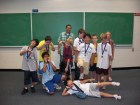
Robotics Summer Camp
Inspiring students to pursue engineering careers remains a high priority concern among governmental agencies and professional societies. To be successful requires attracting well-prepared students to enter engineering academic programs, preferably with a prioi knowledge of real, "everyday" engineering practice. Exposing younger students to detail-oriented activities based on the robotics and controls industries represents such an approach that can appeal to a broad spectrum of engineering interests.
The middle school summer camp provides a design, build, and test experience focusing on the areas of robotics and controls, which emphasizes the underlying mathematics and physical principles. The students work in teams completing design, debugging, reverse engineering, and thought analysis activities. Hands-on activities include experiments with visual servo control, multiple vehicle formation control, systems integration, and design, build, and test laboratory activities. Exposing younger children to "everyday" engineering, such as robotics, is necessary to encourage enrollment in advanced high school math and science classes, and to pursue careers in engineering.
Female and minority students are underrepresented in college engineering programs. Enrollment remains low, taking a recent drop after an enrollment surge in the mid-1980s. Many students are discouraged from pursuing professions in engineering through their dissapointing experiences in math, physics, and chemistry. Added to this are the misconceptions and stereotypes associated with engineering. All of these factors have led to the low number of students pursuing engineering careers. This is especially true in the case of minorities and women. Introducing students to engineering in an interesting manner early in their school career is key in motivating them to study math and science in high school as preparation for college.The robotics summer camp is an innovative program aimed at increasing the quantity, quality and diversity of students pursuing engineering and technical degrees.
The summer camp piques interest in math and science by getting middle school girls and minority students involved in hands-on robotics and engineering activities and providing them contact with people working in various areas of engineering. Guest speakers from local industial companies come in to talk to the participants about their engineering work experience and how their work has triggered new developments. Women and minority guest speakers also talk to the participants, who have received B.S. and M.S. degrees in engineering from the University of Florida (UF) and currently work as engineers. The guest speakers emphasize to the students that most companies are interested in a diverse workforce, which increases employment opportunities for qualified female and minority engineers Karp2006. The motivation behind the structure of the summer camp program is to inspire students from diverse backgrounds to consider engineering careers as a professional option.
The program will be evaluated using student surveys in addition to traditional grading scales. The surveys will ask participants to rate different topics on a scale from 1 to 10. It will also contain open answer questions allowing the students to provide comments and feedback on various aspects of the program. An additional survey will ask students specific questions that address the detail-oriented aspects of the program. This survey data will be analyzed for statistical trends based on gender and race to determine whether anyaspects of the program were appealing to only certain demographic groups of the students.
While a key element in the program is introducing younger students to engineering principles, the importance of teamwork cannot be understated. The structure of this program emphasizes the importance of working in teams with people from diverse backgrounds.This emphasis is lacking in other recently developed middle school engineering programs. By teaching middle school students the importance of teamwork in addition to hands-on engineering activities, they will be better prepared to enter the diverse workforce of the engineering industry.
Summer 08 Pictures and Videos |
 |
University Minority Mentoring Program (UMMP)
UMMP is designed to support students from underrepresented backgrounds and students who are the first in their families to go to college in their transition to the University of Florida and to offer guidance as these students begin to define their goals and strive for academic success. These objectives are achieved through the development of a one-on-one mentoring relationship between the students and a faculty or staff mentor, as well as through small group meetings with mentoring clusters, and joint attendance at cultural and social events. UMMP activities are designed to enhance participantsí experience of the University of Florida as a comfortable, inclusive, and supportive environment in which they can thrive academically and personally.
Student Science Training Program (SSTP)
The University of Florida Student Science Training Program (UF-SSTP) in Gainesville, Florida, is a seven-week residential research program for up to 100 selected rising seniors and qualified rising juniors who are at least 16 years old by the start of the program and considering medicine, math, computer, science, or engineering careers. The program emphasis is research participation with a UF faculty research scientist and his/her research team.
Students live in residence halls on campus. They attend lectures on current topics, attend seminars/workshops in research and technical writing, ethics, study strategies, and career exploration, and gain skills in effective oral presentations. Planned weekend activities include educational and fun field trips, sports, and social activities, including trips to Disney World, Busch Gardens and tubing the Ichetucknee River.
